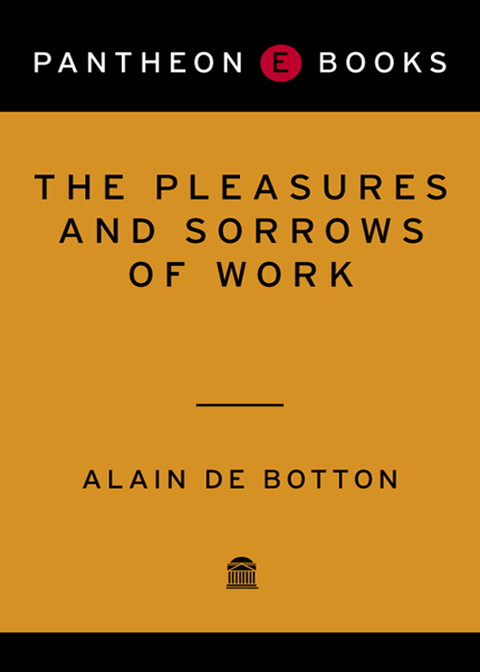
The Pleasures and Sorrows of Work PDF
Preview The Pleasures and Sorrows of Work
Book Description
We spend most of our waking lives at work—in occupations often chosen by our unthinking younger selves. And yet we rarely ask ourselves how we got there or what our occupations mean to us.
The Pleasures and Sorrows of Work is an exploration of the joys and perils of the modern workplace, beautifully evoking what other people wake up to do each day—and night—to make the frenzied contemporary world function. With a philosophical eye and his signature combination of wit and wisdom, Alain de Botton leads us on a journey around a deliberately eclectic range of occupations, from rocket science to biscuit manufacture, accountancy to art—in search of what make jobs either fulfilling or soul-destroying.
Along the way he tries to answer some of the most urgent questions we can ask about work: Why do we do it? What makes it pleasurable? What is its meaning? And why do we daily exhaust not only ourselves but also the planet? Characteristically lucid, witty and inventive, Alain de Botton’s “song for occupations” is a celebration and exploration of an aspect of life which is all too often ignored and a book that shines a revealing light on the essential meaning of work in our lives.
Alain de Botton on The Pleasures and Sorrows of Work
I wrote The Pleasures and Sorrows of Work to shine a spotlight on the working world. I wanted to write a book that would open our eyes to the beauty and occasional horror of the working world—and I did this by looking at 10 different industries, a deliberately eclectic range from accountancy to engineering, from biscuit manufacture to logistics.
The strangest thing about the world of work is the widespread expectation that our work should make us happy. For thousands of years, work was viewed as something to be done with as rapidly as possible and escaped in the imagination through alcohol or religion. Aristotle was the first of many philosophers to state that no one could be both free and obliged to earn a living. A more optimistic assessment of work had to wait until the eighteenth century and men like Jean-Jacques Rousseau and Benjamin Franklin, who for the first time argued that one's working life could be at the centre of any desire for happiness. It was during this century that our modern ideas about work were formed—at the very same time as our modern ideas about love and marriage took shape.
In the pre-modern age, it was assumed that no one could try to be in love and married: marriage was something one did for purely commercial reasons. Things were going well if you maintained a tepid friendship with your spouse. Meanwhile, love was something you did with your mistress, with pleasure untied to the responsibilities of child-rearing. Yet the new philosophers of love argued that one might actually aim to marry the person one was in love with rather than just have an affair. To this unusual idea was added the even more peculiar notion that one might work both for money and to realise one's dreams, an idea that replaced the previous assumption that the day job took care of the rent and anything more ambitious had to happen in one's spare time.
We are the heirs of these two very ambitious beliefs: that you can be in love and married, and in a job and having a good time. It has become as impossible for us to think that you could be out of work and happy as it had once seemed impossible for Aristotle to think that you could be employed and human. Thus is born The Pleasures and Sorrows of Work. —Alain de Botton
(Photo © Roderick Field)
From Publishers WeeklyStarred Review. This pensive study explores work not as an economic or sociological phenomenon but as an existential predicament. Observing an eclectic sample of workers, from fishermen to a CEO of an accounting firm, de Botton (_How Proust Can Change Your Life_) counterposes the expansive intelligence embodied in vast business organizations with the blinkered routines of their human cogs and finds that tension rife with philosophical conundrums. Cookie marketers illustrate the link between happiness and triviality in bourgeois society; office drones wear a mask of shallow cheerfulness over the fury and sadness continually aroused by their colleagues; a visit to a satellite launch center contrasts the restrained self-effacement of rocket scientists with their power to upstage the gods during fiery blastoffs. De Botton's humanism recoils at the banality, crassness and forced optimism of the business mindset, but he admires its ability to construct the world—and even finds poetry in a supermarket supply chain that flies blood-red strawberries... over the Arctic Circle by moonlight, leaving a trail of nitrous oxide across a black and gold sky. (The book includes evocative photos of commercial and industrial sites.) De Botton's sprightly mix of reportage and rumination expands beyond the workplace to investigate the broader meaning of life. (June 2)
Copyright © Reed Business Information, a division of Reed Elsevier Inc. All rights reserved.
